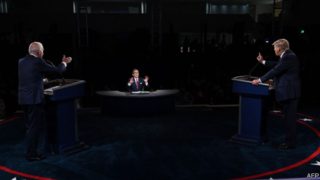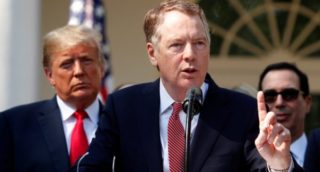Donald Trump and Joe Biden brawled. Neither landed a knockout punch
NEITHER JOE BIDEN nor President Donald Trump is known for his oratory. But one might still have expected them to manage a few coherent sentences during their first presidential debate ahead of the election in November. Yet rather than an exercise in deliberative democracy, it was the least dignified and most dispiriting debate of the modern era of American politics—a snarling, shouty, excruciating affair, marred by Mr Trump’s verbal incontinence.
Perhaps voters should not have expected conventional civility, given Mr Trump’s intemperance. He has been consumed by the continuing disorder of a half-managed pandemic, the hectic rush of Republicans to confirm a new justice to the Supreme Court, and the recent revelations, published in the New York Times, that the president had paid laughably little in tax in many years despite his pretences to moguldom. So Mr Trump needed something unconventional. Because for all the tumult of the previous months, the poll numbers for the fast-approaching election have remained stable. They show a substantial advantage for Mr Biden, who leads national polls by an eight-point margin. Given that, The Economist’s election forecast model gives Mr Biden an 87% chance of winning the contest in five weeks.
The strategy that Mr Trump and his advisers alighted on was one of constant interruption to prevent his opponent (and the unfortunate moderator) from finishing their sentences. “Will you shut up, man” was the most memorable quip of the evening, coming from an exasperated Mr Biden. His campaign has already emblazoned it on a campaign T-shirt (available for $30). Perhaps the idea was sufficiently to confuse the former vice-president, a fellow septuagenarian, as to suggest that he is senile, as Mr Trump has repeatedly insinuated. This is part of a broader conspiracy: that a semi-lucid Mr Biden is really captive to the socialist wing of his party. Mr Trump mocked, among other things, his opponent’s intelligence, that he attended a less prestigious university and that his son was discharged from the army because of drug addiction. But if Mr Biden’s alleged inarticulacy is really such a liability, the duelling streams of consciousness never gave viewers any opportunity to witness it. Occasionally stammering, Mr Biden’s rebuttals often lacked force, but this was easily missed in the pandemonium. Amid the extraordinary levels of polarisation in America, there is limited evidence that debates meaningfully alter votes any more. This unwatchable 90-minute cacophony is unlikely to reverse that general trend.
Pity the voter craving some substance, trying to make sense of it all. Mr Trump embraces the hyperpartisan mentality of American politics so perfectly that there is no inconvenient truth that cannot be swept away by simple assertion. Debates only really work if the debaters acknowledge the same reality. But in the world as Mr Trump sees it, his utterly effective coronavirus response saved millions of Americans from certain death; no president has ever done so well with the economy; and there is a real plan to replace the Affordable Care Act, which provides medical insurance for Americans with pre-existing conditions, without jeopardising health care for millions. The most lucid rebuttal from Mr Biden came after Mr Trump repeated his assertion that Democrats wished to destroy the suburbs with a wave of low-income housing projects. “This is not 1950. All these dog-whistles on racism don’t work any more,” Mr Biden responded, pointing out that what was killing the suburbs at the present moment was covid-19.
Other areas of debate were more farcical. In one episode, Mr Trump accused his opponent of supporting the Green New Deal (he does not) which, he said, would cost $100trn (a somewhat high estimate) that America would need 100 years to pay off (even though this gargantuan sum is “only” five times GDP). Mr Biden pointed out his climate-change plan was different, before confusing the two a few minutes later and saying that “the Green New Deal will pay for itself”.
Amid all the bluster, the most damaging and worrying episode was Mr Trump’s undisguised aim of sowing doubt about the legitimacy of the election that he looks likely to lose. “This is going to be fraud like you’ve never seen,” he warned. The president said that Hillary Clinton had conspired to launch a coup against him, that mailmen in West Virginia were selling ballots, and that a Democratic-run area was sending double ballots to rig the election. The naked disdain for Democrats was also remarkable to see for a sitting president. Mr Trump argued that states run by Democrats were choosing to idle their economies until after the election, not to control covid-19 but to damage his prospects of victory.
This is the sort of undermining of the democratic process that, many fear, precedes violence. A sizeable share of Americans are already telling pollsters that the use of force would be justified if the election does not go their way. Mr Trump refused to condemn white supremacists and called out to the Proud Boys, a far-right group with a penchant for brawling, telling them to “stand back and stand by”. Mr Biden for his part tried to calm things down and reassert American norms. “Once the winner is declared after the ballots are counted, that’ll be the end of it,” he argued. Before that though, there are two more presidential debates to endure.
By The Economist





